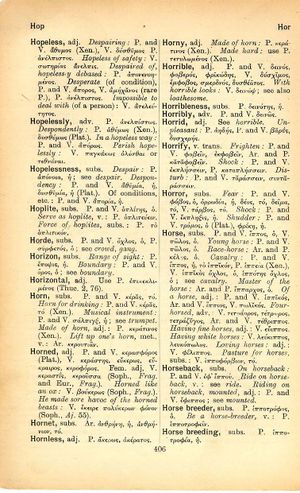horizon
ταῦτα δὲ ἔδει ποιῆσαι κἀκεῖνα μὴ ἀφιέναι → these things should have been done without neglecting the others | these are the things you should have done without neglecting the others | these ought ye to have done, and not to leave the other undone
English > Greek (Woodhouse)
subs.
Range of sight: P. ἔποψις, ἡ. Boundary: P. and V. ὅρος, ὁ; see boundary.
Latin > English (Lewis & Short)
hŏrīzon: ontis, m., = ὁρίζων (sc. κύκλος or ἀήρ).
I The horizon (pure Lat. finiens and finitor), Macr. Somn. Scip. 1, 15 fin.; id. S. 7, 14 fin.; Hyg. Astr. 1, 4.—
II A line drawn through the centre of a sundial, Vitr. 9, 8.
Latin > French (Gaffiot 2016)
hŏrizōn, ontis, m. (ὁρίζων), horizon [t. d’astron.] : Hyg. Astr. 1, 4 ; v. finitor || horizon [borne de la vue] : Macr. Scip. 1, 15, 17 || horizon [d’un cadran solaire] : Vitr. Arch. 9, 7, 6.
Latin > German (Georges)
horizōn, ontis, Akk. ontem, onta, m. (ὁρίζων = begrenzend), I) die Kreislinie, die den Himmel in zwei gleiche Teile teilt u. bestimmt, was wir sehen u. nicht sehen können, der Horizont, Gesichtskreis (rein lat. finiens circulus u. bl. finiens, finitor), Sen. nat. qu. 5, 17, 3. Manil. 1, 665. Macr. somn. Scip. 1, 15, 17. Hyg. astr. 1, 4: horizon vel finitor, Mart. Cap. 8. § 826. – II) bei der Sonnenuhr, die durch den Mittelpunkt gezogene Linie, die den Mittagskreis in zwei gleiche Halbkreise teilt, der Horizont, Vitr. 6, 1, 5 u. 9, 7, 6.

